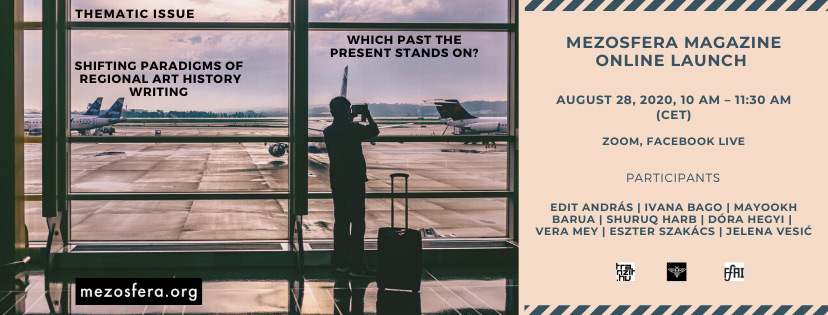2020. augusztus 28. 10.00
Thematic Issue: „Which Past the Present Stands On? Shifting Paradigms of Regional Art History Writing„
On Zoom and Facebook Live on tranzit.hu’s Facebook page.
Please register for the Zoom event here:
https://zoom.us/meeting/register/tJEuceCqrT8sGdavM5YemPCTQNOLyRuuVvN5
Participants of the online launch event: Edit András, Ivana Bago, Mayookh Barua, Shuruq Harb, Dóra Hegyi, Vera Mey, Eszter Szakács, Jelena Vesić
The upcoming Mezosfera (mezosfera.org) issue examines the shifting paradigms of regional art history writing, globally. „Which Past the Present Stands On?” studies how, for what reasons, and with what ramifications the histories of art are rewritten, again and again, along various concepts and from different perspectives (socialist, national, decolonial, global, gender, queer, etc.)? How is ideology able to shape the canon of art and art history writing; how do these diminish, live on; and how can they be bypassed? Concurrently, the issue also aims to study the phenomenon of art history’s shifting paradigm not just in time, but also in space, in conjunction with the different (geo)political notions of “regions” that are considered outside of the Western modernist canon: “Eastern Europe,” “Balkans,” “Middle East,” “Levant,” “Arab World,” “South Asia,” “South East Asia,” “Sub-Saharan Africa,” “East Africa,” “Latin America,” “Southern Cone,” etc. How are the shifting notions of art history and art history writing intertwined with regionalism and/or the ideology of regionalism? What constitutes a region for art history writing? The Mezosfera issue also probes if regionalism and accentuating local specificities bears relevance in current times, and if it is possible to counter—not in mission statements but in practice—exoticizing-othering perspectives when discussing “regions” of the world. Without professing to propose a “new” art history writing, the issue endeavors to look at the various paradigms of regional art history writing, the altering notions of what is considered to be “art” or “region,” from a historical perspective, to see also what still bears relevance (if any) from past practices, and what speculations can be surmised on these bases. The issue invites authors to address these topics through the field of art history, artistic practice, and curating.
Contributors of the issue: Edit András, Ivana Bago with contributing editor: Jelena Vesić, Mayookh Barua, Ada Hajdu, Shuruq Harb, Vera Mey
Edited by Dóra Hegyi and Eszter Szakács
The issue and the event is realized with the support of the Foundation for Arts Initiatives.
